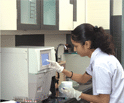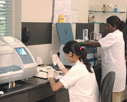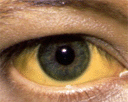FAQ's
WHAT IS THE IMPORTANCE OF PATHOLOGICAL INVESTIGATION?
In the diagnosis of any disease investigations play a key role. Examination
Of Blood, Urine, Stool, Sputum, various body fluids give a clear picture of the onset of diseases and severity of the disease. Investigations can lead to the pin point diagnosis & also helps to know how severe the disease is. E.g. Patient with history of fever approaches clinician. History of the disease & examination can help the clinician to do differential diagnosis but simple blood tests can confirm the diagnosis. As fever could be viral, malaria, dengue, tuberculosis, swine flu, typhoid, urinary tract infection or any other bacterial infection in the body. Thus blood or any fluid examination like X – ray, Sonography, MRI etc can help the clinician to do diagnosis.
Investigations can also help in monitoring patient’s condition & recovery. Investigations can act as a mirror to the recovery from the disease. It also helps in diagnosing any complications occurring during the treatment. Investigation helps in proper diagnosis & timely treatment for the disease.
ONLY A PATIENT SUFFERING FROM DISEAE SHOULD GO FOR INVESTIGATION?
“Prevention is better than cure.’’
Certain diseases are silent disease, where symptoms are not very severe e.g. Diabetes .Patient suffering from diabetes may not show any symptoms& hence disease can increase its severity because of ignorance of the patient. Diagnosis is not possible without blood test.
There are other life style diseases such as abnormal lipid level; hypertension etc. (sedentary life style, lack of regular exercise, Irregular food habits, stress etc) can lead to many serious diseases. These diseases are diagnosed by regular blood check – ups, ECG & stress tests.
WHO ALL CAN DEVELPOE SUCH DISEASES?
Diabetes is a hereditary disease. But it can occur to any one. Age, Gender is no bar. Persons with strong family history are more prone to diabetes, hypertension, and cardiac disease.
India is a capital of diabetes & hence everyone must get checked for diabetes after the age of 30 years.
Fating blood sugar & post predial (2 hrs. after the meal) blood sugar with urine sugar testing should be done for the diagnosis of the disease. Regular check- up at least twice a year is recommended.
Patients having diabetic age of more than 5 years should be investigated for glycosulated hemoglobin & urine micro albumin.
Glycosulated hemoglobin can give average blood glucose level of 8 to 12 weeks.
Long term Diabetes & hypertension can affect kidneys. This can be diagnosed by testing urine micro albumin & serum creatinine
Regular eye check up is also very important for diabetic patients. Long term Diabetes can affect retina of the eye.
SHOULD I GO EMPTY STOMACH FOR BLOOD TESTING?
Most blood tests are performed on empty stomach. Patients can drink water if they need to. For examination of urine first morning sample (mid- stream) should be collected in a clean container. It is preferred that container is provided by the laboratory. Ideally the sample should reach to the laboratory within 2 hrs. of collection.
CARDIAC CHECK- UP & LIPID PROFILE SHOULD BE DONE ON REGULAR BASIS OR FOR THE PATIENTS WITH SYMPOTMS?
Body profile should be done routinely. Patients with any type of symptoms should undergo investigations immediately as per physician’s advice.
Non symptomatic patients also get the body profile done at least once a year after the age of 30 years. (Gender no bar). In body profile all the routine blood tests are performed. Checking for diabetes, cardiac, kidney & liver enzymes are also tested. Urine & stool examination along with blood group is included in body profile.
Patients with any type of addiction should be more careful & must do regular check –ups.
Females above the age of 40 years must go for Pap’s smear at least twice a year. Pap’s smear is a simple non – invasive test done from vagina &cervix. Cervical cancers are most common in females. Pa’s smear can help in diagnosis of cervical cancer.
Fasting Blood Sugar Test
This test shows how well your body uses sugar called glucose. This test may
be done to check for diabetes.
To Prepare
• Do not eat or drink anything, excluding water, after midnight before the
test. This includes coffee, gum, candy and mints.
• Do not smoke after midnight before the test.
• If you are to take your medicines the morning of the test, take them with
sips of water only.
During the Test
• A blood sample is taken with a needle from your arm.
After the Test
• You can eat and drink your normal diet.
• Test results are sent to your doctor. Your doctor will share the results
with you.
Talk to your doctor or nurse if you have any questions or concerns.
Instruments
 Shreeji Pathlab is equipped with the latest hi-tech instruments for giving our patients the best. More>>
Shreeji Pathlab is equipped with the latest hi-tech instruments for giving our patients the best. More>> Tests Done
 The laboratory has provided various body profile
checkups like executive profile, cardiac profile, liver
profile, kidney More>>
The laboratory has provided various body profile
checkups like executive profile, cardiac profile, liver
profile, kidney More>> Seasonal Disease
 Jaundice, also known as icterus, is a condition which is charact erised by a yellowish
discolouration More>>
Jaundice, also known as icterus, is a condition which is charact erised by a yellowish
discolouration More>> 



